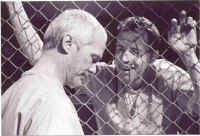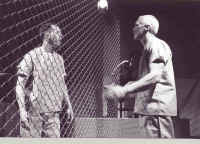 |
 |
| To Lobby | To Playlist |
COYOTE ON A FENCE
January18 – March 8, 2002,
COYOTE ON A FENCE opened at the Alliance Repertory Company in Burbank, California. It is the West Coast Premiere. James Morrison played the part of John Brennan from January 18 – February 15. Peter Fox directed the play. On
the surface, Coyote on a Fence could be seen as a simple exercise,
inviting the audience to ponder the morality of capital punishment. Is it right
or wrong to put another human being to death, regardless of his crimes? And if
we had the chance to really get to know the inmates on death row, would we be so
quick to condemn them? However, it would be a disservice to the play to look no
deeper than this basic outer layer.
On
the surface, Coyote on a Fence could be seen as a simple exercise,
inviting the audience to ponder the morality of capital punishment. Is it right
or wrong to put another human being to death, regardless of his crimes? And if
we had the chance to really get to know the inmates on death row, would we be so
quick to condemn them? However, it would be a disservice to the play to look no
deeper than this basic outer layer. Over
time and a series of charged encounters, John Brennan reluctantly begins to like
Reyburn for his gentle humor and puppyish naiveté, completely disassociated
from his crimes. As Brennan comes to care about Bobby, he becomes increasingly
frustrated by Bobby's lack of concern over his sentence. He has refused to
cooperate with his attorney and appears to be patiently awaiting a fate he feels
he deserves, as a martyr to his cause. Brennan rails against this passivity,
attempting to convince Reyburn to appeal his conviction out of fear of his own
pending execution, and because every death "makes it easier to kill the
rest of us." As he eventually uncovers the details of Bobby's miserable
life, Brennan comes to realize that he is insane, and labors to get the younger
man's sentence commuted to life.
Over
time and a series of charged encounters, John Brennan reluctantly begins to like
Reyburn for his gentle humor and puppyish naiveté, completely disassociated
from his crimes. As Brennan comes to care about Bobby, he becomes increasingly
frustrated by Bobby's lack of concern over his sentence. He has refused to
cooperate with his attorney and appears to be patiently awaiting a fate he feels
he deserves, as a martyr to his cause. Brennan rails against this passivity,
attempting to convince Reyburn to appeal his conviction out of fear of his own
pending execution, and because every death "makes it easier to kill the
rest of us." As he eventually uncovers the details of Bobby's miserable
life, Brennan comes to realize that he is insane, and labors to get the younger
man's sentence commuted to life.